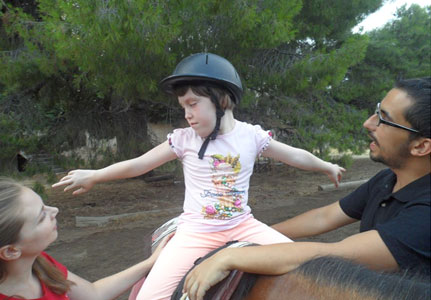Living with a rare disease: Okamoto syndrome
July 2014
Pregnancy and birth
My first daughter Marilena (from Maria Eleni) was born prematurely (32 weeks of pregnancy) due to oligohydramnios, a few weeks before the Olympic Games were held in Athens in 2004. She had very bad respiratory issues to begin with. She was diagnosed with Okamoto syndrome when she was 2 years old. Until then we were struggling with the “unknown”…
During pregnancy, amniocentesis showed a normal 46XX karyotype. My husband and I had no idea about her condition and were shocked the day she was born. We brought her home after 3 months of hospitalisation. I didn’t feel that she was my daughter. I didn’t feel like I was her mother. I felt like I adopted her. It was a very strange feeling! But I loved her so much!
To date, Marilena is the sixth reported case worldwide, of whom two have died.
Okamoto syndrome
Marilena was born with multiple congenital anomalies including cleft palate, stenosis of the ureteropelvic junction with hydronephrosis, and cardiac anomalies, along with generalised hypotonia, severe developmental delay, and growth failure. The distinctive facial appearance includes microcephaly, midface hypoplasia, prominent eyes, epicanthal folds, long eyelashes, synophrys, low-set ears with long earlobe, flat nasal bridge with short upturned nose, open mouth appearance, full lower lip, and downturned mouth. She also has a fixation of the filum terminale and Hirschsprung disease.
Marilena turned 10 years old in June 2014 and she has gone through 10 operations, on her kidneys, intestines, lower spine, cleft palate, along with dozens of hospitalisations. She can’t walk without help. Due to her hypotonia she can’t chew or talk. She has some autism characteristics without being autistic. She can say a few two-syllable words and she cannot write. However we communicate in our own way.
Activities for Marilena
She is attending one of the best special schools in Greece, where she has speech therapy, physiotherapy, watertherapy, occupational therapy, musical therapy, and educational programmes etc. Unfortunately these are not enough for her, as each therapy only takes place one or twice a week. So, she also has speech therapy, physiotherapy and occupational therapy at home. We have also added therapeutic horseback riding twice a week for the past year and a half. She enjoys it very much and it has helped her gain confidence and to improve her “motion” skills.
Marilena at home
Marilena has a younger sister, Evelina, who is 8 years old, and a little brother, who is one year old. They love each other a lot and enjoy playing without jealousy or fights! She also has two little shih tzu dogs, which she adores and plays with a lot. We consider them therapeutic dogs, since every time she hurts she takes one in her lap and hugs it and then magically stops crying.
Marilena is cute, quiet and happy. She is very funny and likes making others laugh. She has amazing strength, and loves to learn new things. She becomes very stubborn when she has to do something which she can’t. The worst days are when she is sick. She suffers frequently from urinary infections with lots of pain and high fever due to her kidney problems. These are her worse days.
Sometimes we cannot understand Marilena and this is a big problem because it makes her nervous and she starts shouting and crying (calling “help”…).
Raising awareness in Greece
Marilena’s syndrome is so rare that nobody knew of it in Greece. After years of personal effort, sending letters to the Greek government and various ministries, being on TV programmes and raising awareness through social media, I finally managed to have Okamoto syndrome recognised in Greece and recorded in the rare diseases list! Unfortunately there is almost no assistance in Greece. Families with disabled children or adults have great difficulties and have major expenses in order to have a decent life.
The government doesn’t seem to understand how high the cost of taking care of a disabled person is. I come up against many problems when I go to the civil services and almost every time I leave crying. I feel like a beggar even when I am requesting what Marilena is entitled to!
Another big problem I face is the public children’s hospital. It is a very good hospital but not for rare diseases. They made the wrong diagnosis several times which led to hospitalisation for many days in private hospitals with very high expenses, which we had to pay. Doctors in the public hospital couldn’t treat Marilena; they didn’t want to operate on her due to her unknown syndrome and the multiple health problems she has. They also kicked me out of the X-ray room once because I was alone with Marilena and she was not cooperating and standing still. No one on the nursing staff would help me hold her still. They told me to go away and come back with another person!
After many bad experiences in the public hospital, and due to their inability to help Marilena, we don’t ever want to go back there. This means that we have to pay a lot for private hospitals when Marilena has to be hospitalised.
Fears for the future
Our dream is that Marilena will one day be independent and capable of taking care of herself (dress by herself, go to the bathroom, etc). Our worst fear is what she will do when her father and I are not alive any more. We don’t want the lives of her siblings to be affected. There are no decent institutions in Greece to leave a disabled child/adult to live.
We believe that there might be other undiagnosed children with Okamoto syndrome and hope that one day we can get in touch with them, as the syndrome is so rare that no prognosis can be made and this is very scary.
Louise Taylor, Communications and Development Writer, EURORDIS
